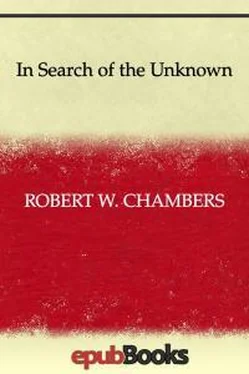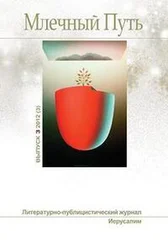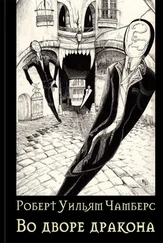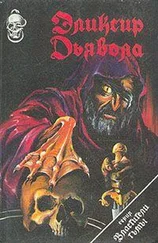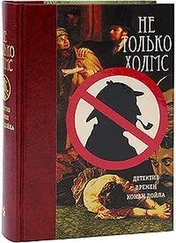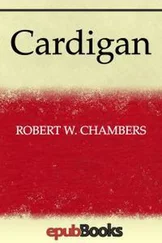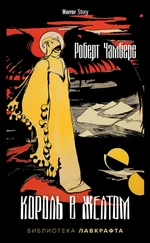Роберт Чамберс - In Search of the Unknown
Здесь есть возможность читать онлайн «Роберт Чамберс - In Search of the Unknown» весь текст электронной книги совершенно бесплатно (целиком полную версию без сокращений). В некоторых случаях можно слушать аудио, скачать через торрент в формате fb2 и присутствует краткое содержание. Год выпуска: 2014, Издательство: epubBooks Classics, Жанр: Фантастика и фэнтези, на английском языке. Описание произведения, (предисловие) а так же отзывы посетителей доступны на портале библиотеки ЛибКат.
- Название:In Search of the Unknown
- Автор:
- Издательство:epubBooks Classics
- Жанр:
- Год:2014
- ISBN:нет данных
- Рейтинг книги:3 / 5. Голосов: 1
-
Избранное:Добавить в избранное
- Отзывы:
-
Ваша оценка:
- 60
- 1
- 2
- 3
- 4
- 5
In Search of the Unknown: краткое содержание, описание и аннотация
Предлагаем к чтению аннотацию, описание, краткое содержание или предисловие (зависит от того, что написал сам автор книги «In Search of the Unknown»). Если вы не нашли необходимую информацию о книге — напишите в комментариях, мы постараемся отыскать её.
In Search of the Unknown — читать онлайн бесплатно полную книгу (весь текст) целиком
Ниже представлен текст книги, разбитый по страницам. Система сохранения места последней прочитанной страницы, позволяет с удобством читать онлайн бесплатно книгу «In Search of the Unknown», без необходимости каждый раз заново искать на чём Вы остановились. Поставьте закладку, и сможете в любой момент перейти на страницу, на которой закончили чтение.
Интервал:
Закладка:
"'She's got a name, and won't come,' I thought. 'Now, what under the sun can I call her?'
"'Aunty,' suggested the man at the next table.
"I sat perfectly still. Could that man have answered my thoughts?—for I had not spoken aloud. Of course not—it was a coincidence—but a very disgusting one.
"'Aunty,' I repeated, mechanically, 'aunty, aunty—good gracious, how horribly human that cat looks!' Then, somehow or other, Shakespeare's words crept into my head and I found myself repeating: 'The soul of my grandam might haply inhabit a bird; the soul of—nonsense!' I growled—'it isn't printed correctly! One might possibly say, speaking in poetical metaphor, that the soul of a bird might haply inhabit one's grandam—' I stopped short, flushing painfully. 'What awful rot!' I murmured, and lighted another cigar. The cat was still staring; the cigar went out. I grew more and more nervous. 'What rot!' I repeated. 'Pythagoras must have been an ass, but I do believe there are plenty of asses alive to–day who swallow that sort of thing.'
"'Who knows?' sighed the man at the next table, and I sprang to my feet and wheeled about. But I only caught a glimpse of a pair of frayed coat–tails and a bald head vanishing into the dining–room. I sat down again, thoroughly indignant. A moment later the cat got up and went away.
XXIII
"Daylight was fading in the city of Antwerp. Down into the sea sank the sun, tinting the vast horizon with flakes of crimson, and touching with rich deep undertones the tossing waters of the Scheldt. Its glow fell like a rosy mantle over red–tiled roofs and meadows; and through the haze the spires of twenty churches pierced the air like sharp, gilded flames. To the west and south the green plains, over which the Spanish armies tramped so long ago, stretched away until they met the sky; the enchantment of the after–glow had turned old Antwerp into fairy–land; and sea and sky and plain were beautiful and vague as the night–mists floating in the moats below.
"Along the sea–wall from the Rubens Gate all Antwerp strolled, and chattered, and flirted, and sipped their Flemish wines from slender Flemish glasses, or gossiped over krugs of foaming beer.
"From the Scheldt came the cries of sailors, the creaking of cordage, and the puff! puff! of the ferry–boats. On the bastions of the fortress opposite, a bugler was standing. Twice the mellow notes of the bugle came faintly over the water, then a great gun thundered from the ramparts, and the Belgian flag fluttered along the lanyards to the ground.
"I leaned listlessly on the sea–wall and looked down at the Scheldt below. A battery of artillery was embarking for the fortress. The tublike transport lay hissing and whistling in the slip, and the stamping of horses, the rumbling of gun and caisson, and the sharp cries of the officers came plainly to the ear.
"When the last caisson was aboard and stowed, and the last trooper had sprung jingling to the deck, the transport puffed out into the Scheldt, and I turned away through the throng of promenaders; and found a little table on the terrace, just outside of the pretty café. And as I sat down I became aware of a girl at the next table—a girl all in white—the most ravishingly and distractingly pretty girl that I had ever seen. In the agitation of the moment I forgot my name, my fortune, my aunt, and the Crimson Diamond—all these I forgot in a purely human impulse to see clearly; and to that end I removed my monocle from my left eye. Some moments later I came to myself and feebly replaced it. It was too late; the mischief was done. I was not aware at first of the exact state of my feelings—for I had never been in love more than three or four times in all my life—but I did know that at her request I would have been proud to stand on my head, or turn a flip–flap into the Scheldt.
"I did not stare at her, but I managed to see her most of the time when her eyes were in another direction. I found myself drinking something which a waiter brought, presumably upon an order which I did not remember having given. Later I noticed that it was a loathsome drink which the Belgians call 'American grog,' but I swallowed it and lighted a cigarette. As the fragrant cloud rose in the air, a voice, which I recognized with a chill, broke, into my dream of enchantment. Could he have been there all the while—there sitting beside that vision in white? His hat was off, and the ocean–breezes whispered about his bald head. His frayed coat–tails were folded carefully over his knees, and between the thumb and forefinger of his left hand he balanced a bad cigar. He looked at me in a mildly cheerful way, and said, 'I know now.'
"'Know what?' I asked, thinking it better to humor him, for I was convinced that he was mad.
"'I know why cats bite.'
"This was startling. I hadn't an idea what to say.
"'I know why,' he repeated; 'can you guess why?' There was a covert tone of triumph in his voice and he smiled encouragement. 'Come, try and guess,' he urged.
"I told him that I was unequal to problems.
"'Listen, young man,' he continued, folding his coat–tails closely about his legs—'try to reason it out: why should cats bite? Don't you know? I do.'
"He looked at me anxiously.
"'You take no interest in this problem?' he demanded.
"'Oh yes.'
"'Then why do you not ask me why?' he said, looking vaguely disappointed.
"'Well,' I said, in desperation, 'why do cats bite?—hang it all!' I thought, 'it's like a burned–cork show, and I'm Mr. Bones and he's Tambo!'
"Then he smiled gently. 'Young man,' he said, 'cats bite because they feed on catnip. I have reasoned it out.'
"I stared at him in blank astonishment. Was this benevolent–looking old party poking fun at me? Was he paying me up for the morning's snub? Was he a malignant and revengeful old party, or was he merely feeble–minded? Who might he be? What was he doing here in Antwerp—what was he doing now?—for the bald one had turned familiarly to the beautiful girl in white.
"'Wilhelmina,' he said, 'do you feel chilly?' The girl shook her head.
"'Not in the least, papa.'
"'Her father!' I thought—'her father!' Thank God she did not say 'popper'!
"'I have been to the Zoo to–day,' announced the bald one, turning towards me.
"'Ah, indeed,' I observed; 'er—I trust you enjoyed it.'
"'I have been contemplating the apes,' he continued, dreamily. 'Yes, contemplating the apes.'
"I tried to look interested.
"'Yes, the apes,' he murmured, fixing his mild eyes on me. Then he leaned towards me confidentially and whispered, 'Can you tell me what a monkey thinks?'
"'I cannot,' I replied, sharply.
"'Ah,' he sighed, sinking back in his chair, and patting the slender hand of the girl beside him—'ah, who can tell what a monkey thinks?' His gentle face lulled my suspicions, and I replied, very gravely:
"'Who can tell whether they think at all?'
"'True, true! Who can tell whether they think at all; and if they do think, ah! who can tell what they think?'
"'But,' I began, 'if you can't tell whether they think at all, what's the use of trying to conjecture what they would think if they did think?'
"He raised his hand in deprecation. 'Ah, it is exactly that which is of such absorbing interest—exactly that! It is the abstruseness of the proposition which stimulates research—which stirs profoundly the brain of the thinking world. The question is of vital and instant importance. Possibly you have already formed an opinion.'
"I admitted that I had thought but little on the subject.
"'I doubt,' he continued, swathing his knees in his coat–tails—'I doubt whether you have given much attention to the subject lately discussed by the Boston Dodo Society of Pythagorean Research.'
Читать дальшеИнтервал:
Закладка:
Похожие книги на «In Search of the Unknown»
Представляем Вашему вниманию похожие книги на «In Search of the Unknown» списком для выбора. Мы отобрали схожую по названию и смыслу литературу в надежде предоставить читателям больше вариантов отыскать новые, интересные, ещё непрочитанные произведения.
Обсуждение, отзывы о книге «In Search of the Unknown» и просто собственные мнения читателей. Оставьте ваши комментарии, напишите, что Вы думаете о произведении, его смысле или главных героях. Укажите что конкретно понравилось, а что нет, и почему Вы так считаете.
